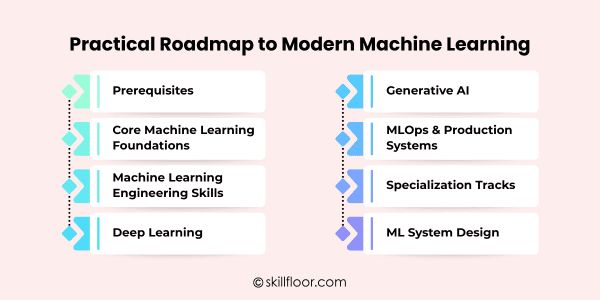The Ultimate Machine Learning Roadmap for 2026
A complete, future-proof machine learning roadmap for 2026 showing what to learn, what to skip, and how to build skills to become job-ready in the modern era.

Global IT reports predict that over 85% of organizations will employ machine learning in some capacity by 2025. Learning machine learning in 2018 was like gradually ascending a large mountain. It feels more like attempting to surf a swift and untamed ocean wave in 2026.
Nearly every week, a brand-new model, gadget, or significant update appears with the promise of revolutionizing everything. Your LinkedIn feed is full of people starting startups, developing AI tools, and landing positions that didn't even exist a few years ago.
"Am I too late?" "What should I even learn now?" and "Why does everyone else look so far ahead?" are some of the questions you may be asking yourself. This is the ideal time to begin, but only provided you adhere to a well-defined and astute plan of action.
What Does “Machine Learning” Mean in 2026?
In 2026, machine learning is more than just model training. It is about creating intelligent systems that can use tools, think, search, plan, and assist real people in solving real problems daily.
-
Building Real Solutions: These days, machine learning entails employing pre-made models rather than starting from scratch and concentrating more on using clever and straightforward concepts to solve actual business challenges.
-
From Notebooks to Apps: Instead of only conducting experiments in notebooks that no one else would ever use, it involves integrating data, models, and tools to create practical applications.
-
Thinking About Users: You spend less time fine-tuning models for little score gains and more time considering user needs, speed, and cost.
-
Many Types of Data: Nowadays, a lot of systems are able to read, see, listen, and write simultaneously, which increases the usefulness of machine learning in everyday chores and jobs.
-
Making Systems Reliable: Additionally, machine learning entails employing cloud technologies, straightforward pipelines, and basic monitoring to ensure that your system continues to function even after a large number of users begin to use it.
-
Helping People Work: In 2026, machine learning will primarily focus on developing tools that enable individuals to make better decisions, save time, and do actual tasks more quickly.
What Does a Machine Learning Career Look Like in 2026?
In 2026, a career in machine learning will focus more on creating practical systems that leverage powerful machine learning skills to tackle actual issues than it will on creating models.
-
More Than Models: In addition to training models, you will link data, tools, and basic logic to create comprehensive systems that users can truly utilize.
-
Many Types of Roles: In order to create practical AI tools, some people concentrate on data, others on systems, some on products, and some on research.
-
Working With Products: You will collaborate closely with the business and product teams to ensure that your work benefits users rather than merely look nice in tests.
-
Using Ready Tools: Most of the time, you will use pre-made models and tools and concentrate more on making them function well in practical and straightforward ways.
-
Caring About Quality: When a large number of people begin using the system, you will have to spend time verifying outcomes, correcting mistakes, and ensuring that it remains stable, safe, and beneficial.
-
Learning All the Time: You will continue to learn new things, experiment with new concepts, and develop your skills annually to remain competent and self-assured because tools change quickly.
Practical Roadmap to Modern Machine Learning
This roadmap shows how to proceed step-by-step, acquire machine learning techniques, and construct practical projects that prevent misunderstanding, concentrate on practical abilities, and assist you in developing systems that genuinely function.
1. Prerequisites
Develop the necessary technical and analytical maturity to make machine learning feel focused, organized, and intuitive rather than overwhelming and frustrating later.
Programming
-
Python
-
numpy, pandas, matplotlib, seaborn
-
scikit-learn
-
PyTorch (or TensorFlow)
-
Git & GitHub
-
Basic Linux & CLI
If you can’t write clean Python and debug code comfortably, ML will feel like hell.
Math (Only What You Need)
-
Linear Algebra: vectors, matrices, dot products
-
Probability & Statistics: distributions, mean, variance, Bayes
-
Calculus: gradients, partial derivatives
-
Optimization intuition
You don’t need to be a mathematician. You need intuition.
2. Core Machine Learning Foundations
Recognize how machines learn from data and how to confidently and clearly reason about issues, solutions, and outcomes.
Data Handling & EDA
-
Data cleaning
-
Feature engineering
-
Handling missing values
-
Avoiding data leakage
-
Exploratory Data Analysis
-
Data-centric AI mindset
Classical ML Algorithms
-
Linear & Logistic Regression
-
KNN, Naive Bayes
-
Decision Trees, Random Forest
-
XGBoost, LightGBM, CatBoost
-
SVM
-
Clustering (KMeans, DBSCAN)
-
PCA, UMAP
Evaluation & Debugging
-
Metrics: F1, AUC, RMSE, etc.
-
Bias–variance tradeoff
-
Overfitting & underfitting
-
Error analysis
3. Machine Learning Engineering Skills
Discover how to turn trials into organized, dependable, maintainable systems that others can comprehend, replicate, trust, and expand over time.
-
ML pipelines
-
Experiment tracking (MLflow, W&B)
-
Feature stores
-
Data & model versioning
-
Reproducibility
-
Writing modular, testable ML code
4. Deep Learning
Examine contemporary learning systems that find representations and resolve challenging issues, facilitating advancements in the fields of vision, language, and multimodal intelligence.
Foundations
-
Neural networks
-
Backpropagation
-
Optimizers (Adam, AdamW)
-
Regularization
-
Normalization
-
Learning rate schedules
Computer Vision
-
CNNs, Vision Transformers
-
Classification, detection, segmentation
-
Multimodal models
NLP & Transformers
-
Transformer architecture
-
BERT, GPT, T5 concepts
-
Embeddings
-
Fine-tuning
-
RAG pipelines

5. Generative AI
Replace predictive models with creative and agentic systems that produce, reason, and engage in a variety of real-world tasks and workflows.
You must understand:
-
How LLMs work internally
-
Prompt engineering (but not relying on it)
-
Tool calling & function calling
-
Agent architectures
-
RAG systems
-
Vector databases (FAISS, Pinecone, etc.)
-
LoRA, adapters, fine-tuning
-
Evaluation of GenAI systems
Future ML engineers will be AI architects who design systems, integrate tools, orchestrate models, and produce scalable, real-world intelligence rather than merely building models.
6. MLOps & Production Systems
Concentrate on creating systems that function consistently, reliably, and predictably in order to make machine learning dependable in the real world.
-
Model serving (FastAPI, TorchServe)
-
CI/CD for ML
-
Monitoring & drift detection
-
A/B testing
-
Cost optimization
-
Observability for LLM apps
7. Specialization Tracks
Select a targeted path and gradually expand your knowledge to address a certain class of issues at a professional impact level.
Applied ML Engineer
-
Recommendation systems
-
Ranking systems
-
Forecasting
LLM / GenAI Engineer
-
Copilots
-
Agents
-
Enterprise AI systems
Research / Scientist
-
Reading papers
-
Reproducing SOTA
-
Training models
Domain AI
Healthcare, Finance, Robotics, etc.
8. ML System Design
Discover how to create comprehensive machine learning systems that successfully manage performance, scalability, dependability, cost, and practical limitations.
-
End-to-end system design
-
Data pipelines
-
Batch vs real-time inference
-
Scaling strategies
-
Cost vs latency tradeoffs
Building a Strong Portfolio and Career in Machine Learning
Developing a solid career in machine learning requires you to demonstrate your ability to transform data into trustworthy outcomes, solve real-world issues, and present your work.
-
Show Real Projects: Make projects that address real-world issues, clearly communicate your ideas, and demonstrate how your work may benefit people or companies in useful ways.
-
Write Clear Stories: Clearly describe what you developed, why you built it, and how it operates in case studies that are understandable to all.
-
Focus On Impact: Concentrate on projects that demonstrate actual value rather than merely intricate models, and describe how your system saves money, time, or effort.
-
Keep Improving Skills: To ensure that your work remains robust and helpful over time, keep learning new tools, developing your thinking, and updating your projects.
-
Share Your Work: Put your creations online, write about what you've learned, and discuss your work to showcase your abilities and concepts to a wider audience.
-
Prepare For Interviews: Practice communicating your projects, decisions, and outcomes in a straightforward manner that demonstrates assurance, lucidity, and genuine comprehension.
How Long Does It Take to Learn Machine Learning?
A well-structured Machine Learning Roadmap makes development predictable, measurable, and realistically feasible over time. However, the trip depends on your background, consistency, and goals.
1. First Three Months
You gain self-assurance, comprehend learning patterns, and begin navigating the Machine Learning Roadmap with clarity, momentum, and increasing technical comfort throughout this phase.
2. Six Month Mark
By now, you should be able to construct basic projects, comprehend trade-offs, and explore the majority of the Machine Learning Roadmap's sections without feeling overburdened or lost.
3. One Year Point
At this point, you can construct entire systems, think critically about design decisions, and modify the Machine Learning Roadmap to suit your own objectives.
4. Eighteen Months In
You begin to refine depth, confidence, and long-term direction while thinking in systems, enhancing dependability, and resolving unclear issues.
5. Two Year Level
You make architectural decisions, work independently, and prioritize impact, scalability, and long-term maintainability over merely learning concepts.
6. Continuous Growth Phase
The key objective of machine learning is to continuously develop, remain relevant, and change in tandem with quickly expanding technologies, concepts, and expectations.
Common Mistakes in Learning Machine Learning
Instead of developing true comprehension, many students waste months chasing tools, following random advice, ignoring foundational concepts, and using the Machine Learning Syllabus as a checklist.
1. Skipping Strong Foundations
Without strong foundations, the Machine Learning Roadmap feels overwhelming and leads to frequent rebuilding rather than steady forward motion over time.
2. Only Watching Courses
False confidence is created by consuming repeated lessons, yet knowledge remains passive and vanishes when real challenges require autonomous thought and problem-solving abilities.
3. Chasing Every Tool
Frequent framework switching hinders depth, fosters superficial familiarity, and squanders time that could be used to grasp the ideas that make the Machine Learning Roadmap genuinely useful and long-lasting.
4. Ignoring Real Systems
Solutions that operate in isolation but fall short in real-world settings are produced when models are the primary focus and integration, dependability, and long-term operation are neglected.
5. Avoiding Difficult Topics
Although it may seem convenient to skip difficult topics, doing so eventually results in knowledge gaps that impair confidence, intuition, and the capacity to independently tackle unknown issues.
6. No Clear Direction
Without a roadmap, learning results in haphazard advancement, low motivation, and frequent context switching, all of which impede development and hinder the development of significant long-term skill.
Machine learning may appear to be a fast-paced, noisy, and complex field, but it doesn't have to be. You may advance step by step without feeling lost if you have patience, attention, and a clear Machine Learning Roadmap. You don't have to be an expert. All you have to do is continue to grow, learn, and get a little better every day. A lot of people give up because they compare themselves to others or try to expedite things. Avoid doing that. Use the Machine Learning Roadmap as a guide rather than a source of pressure, go at your own speed, and have faith in the process. You'll see genuine progress when you look back over time. Continue using your Machine Learning Roadmap, be inquisitive, and remain straightforward.






























































